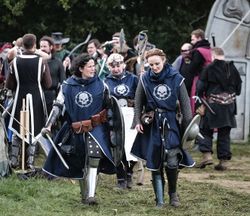Chapter
mNo edit summary |
|||
| Line 1: | Line 1: | ||
{{CaptionedImage|file=Chapter1.jpg|title=Luke helps Kruger of the Shattered Tower into his armour.|caption=A chapterhouse is founded on community and cooperation.|align=right|width= | {{CaptionedImage|file=Chapter1.jpg|title=Luke helps Kruger of the Shattered Tower into his armour.|caption=A chapterhouse is founded on community and cooperation.|align=right|width=250}} | ||
The oldest chapters are amongst the most heavily fortified, with concentric rings of stone built over the centuries as the settlement has grown. Inside the walls are beautiful stone buildings dressed with marble frescoes depicting scenes of the lives of the paragons or Imperial triumphs. Every chapter has a degree of autonomy, but they are unified by their heritage, their faith and their belief in the Empire. | The oldest chapters are amongst the most heavily fortified, with concentric rings of stone built over the centuries as the settlement has grown. Inside the walls are beautiful stone buildings dressed with marble frescoes depicting scenes of the lives of the paragons or Imperial triumphs. Every chapter has a degree of autonomy, but they are unified by their heritage, their faith and their belief in the Empire. | ||
| Line 5: | Line 5: | ||
The first chapters were built inside existing fortifications constructed on the borders of Highguard. These chapters carry the burden of protecting the nation against barbarian raids and incursions and include hundreds or even thousands of experienced soldiers. Later chapters were constructed in the interior where there is less need of constant vigil so these tend to include more scholars, philosophers and crafters. | The first chapters were built inside existing fortifications constructed on the borders of Highguard. These chapters carry the burden of protecting the nation against barbarian raids and incursions and include hundreds or even thousands of experienced soldiers. Later chapters were constructed in the interior where there is less need of constant vigil so these tend to include more scholars, philosophers and crafters. | ||
{{CaptionedImage|file=ChantrySkull.jpg|title=Dedicated to Prosperity, the priests of the Chantry act as stewards of the dead, providing lavish funerals and interments to those who merit it..|caption=The chapters were born out of a hunger for virtue.|align=right|width= | {{CaptionedImage|file=ChantrySkull.jpg|title=Dedicated to Prosperity, the priests of the Chantry act as stewards of the dead, providing lavish funerals and interments to those who merit it..|caption=The chapters were born out of a hunger for virtue.|align=right|width=250}} | ||
The chapters were born during the Revelation, when the people rejected corruption and hungered for virtue, yet this was a time before the Synod and there were many conflicting views about the nature of virtue and of visions granted by [[Liao#True_Liao|true liao]]. Each chapterhouse offered the promise of salvation, enlightenment and protection from corruption and wickedness encapsulated in their creed. The nature of a chapter’s creed varies but the broad theme was to state the shared beliefs and purpose of the chapter – and how they held to virtue over corruption. | The chapters were born during the Revelation, when the people rejected corruption and hungered for virtue, yet this was a time before the Synod and there were many conflicting views about the nature of virtue and of visions granted by [[Liao#True_Liao|true liao]]. Each chapterhouse offered the promise of salvation, enlightenment and protection from corruption and wickedness encapsulated in their creed. The nature of a chapter’s creed varies but the broad theme was to state the shared beliefs and purpose of the chapter – and how they held to virtue over corruption. | ||
Revision as of 13:31, 19 February 2018
The oldest chapters are amongst the most heavily fortified, with concentric rings of stone built over the centuries as the settlement has grown. Inside the walls are beautiful stone buildings dressed with marble frescoes depicting scenes of the lives of the paragons or Imperial triumphs. Every chapter has a degree of autonomy, but they are unified by their heritage, their faith and their belief in the Empire.
At the centre of each chapter is the chapterhouse, a beautiful edifice constructed of hard granite dressed with white marble. The chapterhouse is a place of devotion, but also the heart of the community. It serves as a meeting hall and storehouse, and as the final line of defence if the chapter is attacked. The Highborn pride themselves on the strong sense of community within a chapter. They work together and often eat together, meeting daily in the chapterhouse for prayers and to break fast. The people of a chapterhouse are brought about by a shared purpose and belief. There tend to be few social barriers within a chapter as crafters, soldiers, scholars, labourers and priests come together regularly to affirm their bonds of loyalty, or eat together, or celebrate. The tensions within Highguard, where they exist, tend to be between differing chapters whose beliefs and attitudes may conflict.
The first chapters were built inside existing fortifications constructed on the borders of Highguard. These chapters carry the burden of protecting the nation against barbarian raids and incursions and include hundreds or even thousands of experienced soldiers. Later chapters were constructed in the interior where there is less need of constant vigil so these tend to include more scholars, philosophers and crafters.
The chapters were born during the Revelation, when the people rejected corruption and hungered for virtue, yet this was a time before the Synod and there were many conflicting views about the nature of virtue and of visions granted by true liao. Each chapterhouse offered the promise of salvation, enlightenment and protection from corruption and wickedness encapsulated in their creed. The nature of a chapter’s creed varies but the broad theme was to state the shared beliefs and purpose of the chapter – and how they held to virtue over corruption.
Some chapters held to a single virtue, and some even to a single paragon, such as the Scions of Atun. Others, such as The Illuminated Soul, took a broader approach, welcoming all forms of virtue but requiring those that dwelt there to be transparent in all aspects of their lives so that deception and wickedness had no place to hide. A smaller set focussed their creed on a purpose or calling, for example, the creed of The Arrows of Truth speaks of their calling to hunt and slay dangerous creatures that have escaped the eternal realms. Even in the age of the Imperial Synod, there are chapters who hold that their way of living, their creed, is the equal or superior of the Way, which is for lesser souls.
Additional Reading
A short list of prominent Highborn chapters can be found here.
When choosing where your chatper is based, it may be useful to look over this page which details some of the themes of the Highborn territories.

